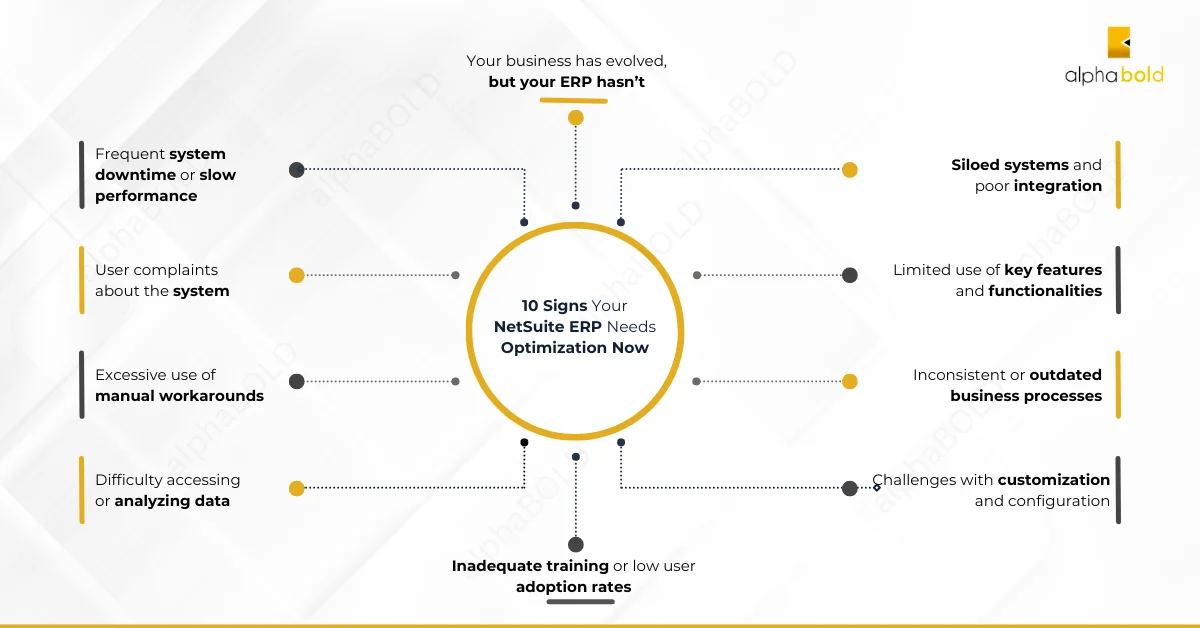Introduction
Is your NetSuite ERP causing more headaches than solutions? You’re not alone. Many businesses face challenges with their ERP systems — from sluggish performance and frustrated users to inefficient processes that slow growth. The good news? These issues aren’t just problems to endure; they’re often signs that your NetSuite solution could benefit from optimization.
NetSuite ERP optimization is the process of fine-tuning your ERP system to ensure it aligns perfectly with your business goals. By optimizing your NetSuite solution, you can streamline operations, eliminate manual workarounds, reduce costs, and enhance overall system performance. An optimized ERP runs smoothly and empowers your team to make data-driven decisions, improving productivity and driving business growth.
In this post, we’ll help you determine if your system could benefit from NetSuite ERP optimization by covering the top 10 signs that indicate it might need some attention.
Why NetSuite Optimization Matters
Did you know that 53% of IT decision-makers have identified ERP as a top investment priority alongside CRM implementation? Moreover, 50% of organizations plan to acquire, upgrade, or update their ERP systems soon. This shows how critical ERP systems are to business operations and why ensuring optimal performance is key to staying competitive and efficient (source: Oracle NetSuite and EPC Group).
A well-optimized ERP system like NetSuite is the backbone of any successful business operation. It centralizes data, streamlines processes, and provides the insights needed to make informed decisions. When NetSuite is running smoothly, it becomes a powerful tool that aligns every part of your organization toward common goals—from finance and procurement to sales and customer service.
However, when your NetSuite ERP isn’t optimized, it can lead to significant inefficiencies that directly impact your business growth, productivity, and profitability. Slow performance, frequent errors, and cumbersome processes can frustrate employees and waste time and resources. Over time, these inefficiencies can accumulate, causing delays, reduced customer satisfaction, and even lost revenue. The longer these problems go unaddressed, the more they can grow, eventually becoming costly disruptions that affect your bottom line.
Recognizing the early signs of a suboptimal NetSuite ERP can prevent minor issues from escalating into major roadblocks. By identifying these warning signs early, you can take proactive steps to optimize your system, keeping your business operations efficient and competitive.
Further Reading: Optimizing Operations with NetSuite Consulting
Now, let’s explore the top 10 signs that your NetSuite ERP optimization is due and how addressing these issues can unlock your software’s full potential.
NetSuite Implementation Audit
Is your NetSuite ERP running at its full potential? Get a NetSuite ERP Optimization Audit today and discover how to maximize efficiency and streamline your operations.
Request Optimization Audit10 Signs Your Due for a NetSuite ERP Optimization
No ERP system is perfect out of the box, and even the best solutions, like NetSuite, require regular evaluation and fine-tuning to stay aligned with your business’s evolving needs. But how do you know when it’s time for a closer look? Here are 10 signs that your NetSuite ERP might not perform at its peak. Identifying these issues early on can help you avoid costly disruptions and ensure your system is fully optimized to drive growth, productivity, and profitability.
1. Frequent System Downtime or Slow Performance
Frequent downtimes or sluggish performance are clear signs of NetSuite ERP optimization issues. When your system frequently crashes or takes too long to load, it disrupts daily operations and frustrates employees. These NetSuite problems can lead to delays, missed deadlines, and a significant drop in productivity. An optimized NetSuite ERP should run smoothly and efficiently, allowing your team to focus on their core tasks without interruptions.
2. User Complaints About the System
If your users consistently complain about system usability, speed, or difficulty finding data, it may indicate underlying problems with your NetSuite ERP. Common complaints include a confusing interface, slow response times, or challenges navigating the system to access critical information. These issues often point to a need for system optimization to improve the user experience and overall efficiency.
3. Excessive Use of Manual Workarounds
Is your team relying heavily on spreadsheets or other manual processes to complete tasks that should be handled within NetSuite? This excessive use of manual workarounds is often a red flag that your system is not fully optimized. While these temporary fixes may solve short-term issues, they typically lead to inefficiencies, errors, and wasted time. A proper NetSuite ERP optimization minimizes the need for manual workarounds by automating and streamlining processes.
4. Difficulty Accessing or Analyzing Data
If your team struggles to access or analyze data, you’re dealing with serious data-related NetSuite problems. In a data-driven economy, hard-to-access data hampers decision-making and undermines your business intelligence efforts. A NetSuite ERP optimization can help resolve these issues by improving data organization, accessibility, and analytics capabilities, enabling faster decision-making.
5. Siloed Systems and Poor Integration
The lack of integration between NetSuite and other business systems creates silos that reduce visibility and complicate data management. This often results in disjointed workflows, duplicate data entry, and missed opportunities for efficiency. A NetSuite ERP optimization can help integrate your key business systems, improving data visibility and streamlining operations.
6. Limited Use of Key Features and Functionalities
Are you taking full advantage of NetSuite’s capabilities? Many businesses underutilize available features, missing out on opportunities to automate tasks, improve productivity, and drive growth. If your system feels limited or outdated, it’s a sign of underutilized NetSuite features that could be leveraged for better performance. Optimization involves uncovering and deploying these features to maximize their benefits.
7. Inconsistent or Outdated Business Processes
Outdated or inconsistent processes that no longer align with your current business needs can create bottlenecks and inefficiencies. If your NetSuite ERP isn’t reflecting your latest workflows or business models, it’s time for an update. Optimization allows revisiting and refining these processes, ensuring that your ERP supports your business’s most current requirements.
8. Challenges with Customization and Configuration
Many businesses struggle with NetSuite customization issues that make their ERP too complex or fail to deliver the desired results. Over time, customizations can become unwieldy, leading to errors and inefficiencies. An optimization audit can assess your current configurations and help simplify or improve them, ensuring your ERP system is tailored to your specific business needs.
9. Inadequate Training or Low User Adoption Rates
Poor training and low user adoption rates can severely impact the effectiveness of your NetSuite ERP. If employees are resistant to using the system or don’t understand how to use it efficiently, it could be a sign that your ERP needs to be re-evaluated and optimized. A NetSuite ERP optimization isn’t just about the technology; it also involves enhancing user training and support to ensure everyone is on board and using the system to its full potential.
Further Reading: Building Your Team for NetSuite Implementation
10. Your Business Has Evolved, But Your ERP Hasn't
Has your business experienced growth, mergers, regulatory changes, or a shift in market strategy? If so, your ERP system may no longer fully align with your evolving business needs. Without optimization, your NetSuite ERP may fail to support new processes, resulting in inefficiencies and missed opportunities. Optimizing your ERP allows it to adapt to your business’s changing landscape, ensuring it remains a valuable asset in achieving your strategic goals.
Recognizing these signs early is crucial to maintaining a healthy and efficient NetSuite ERP. If these symptoms sound familiar, it might be time for a NetSuite Optimization Audit. In the next section, we’ll explore how an audit can help resolve these issues and unlock the full potential of your ERP system.
NetSuite Implementation Audit
Ready to eliminate bottlenecks and boost your NetSuite ERP performance? Schedule your optimization audit today and unlock the full potential of your NetSuite system.
Request Optimization AuditThe Cost of Ignoring These Signs
Ignoring the signs that your NetSuite ERP needs optimization can seriously affect your business. An unoptimized ERP system can lead to significant risks and costs that impact every aspect of your operations. For instance, frequent system downtimes and sluggish performance can result in lost productivity, as employees spend valuable time waiting for the system to load or finding workarounds for problems. This lost time quickly adds up, translating into lower efficiency and reduced output across your entire organization.
In addition, an unoptimized ERP can drive up operational costs. Relying on manual processes, dealing with data silos, and managing complex customizations can consume both time and resources, increasing the overall cost of doing business. These inefficiencies affect day-to-day operations and limit your ability to respond quickly to market changes, adapt to new business models, or seize new growth opportunities.
Perhaps most critically, failing to address these signs can result in missed opportunities for growth. When your ERP system isn’t performing at its best, you’re less likely to make data-driven decisions, respond to customer needs effectively, or innovate in ways that set you apart from the competition. The longer these issues persist, the greater the risk of falling behind in a fast-paced market.
That’s why timely NetSuite ERP optimization is crucial. By promptly addressing these signs, you can ensure your NetSuite ERP remains a powerful tool that supports your business goals, rather than a barrier to success. Don’t let minor issues become major roadblocks — take proactive steps to optimize your system and keep your business moving forward.
How to Address NetSuite ERP Issues
If you’ve noticed these signs in your business, it’s time to take action. Start by assessing your current NetSuite configuration and identifying where improvements can be made. Look for areas where processes could be streamlined, data access could be enhanced, or features could be better utilized.
Remember, a NetSuite ERP optimization isn’t just about fixing what’s broken — it’s about aligning your ERP system with your business’s evolving needs to drive efficiency and growth.
For a detailed analysis and customized recommendations, consider consulting with a NetSuite expert who can help you uncover hidden opportunities for optimization.
NetSuite Implementation Audit
Don’t wait for minor issues to become major problems. Reach out today to learn more about NetSuite ERP optimization and keeping your business on track.
Request Optimization AuditConclusion
The signs that you need NetSuite ERP optimization are often easy to spot: frequent system downtimes, user complaints, excessive manual processes, and difficulty accessing data, are just a few. Addressing these issues early through proper optimization can prevent costly disruptions and ensure your business operates smoothly.
To ensure your NetSuite ERP fully aligns with your goals, consider contacting a specialist who can provide tailored advice and support.










